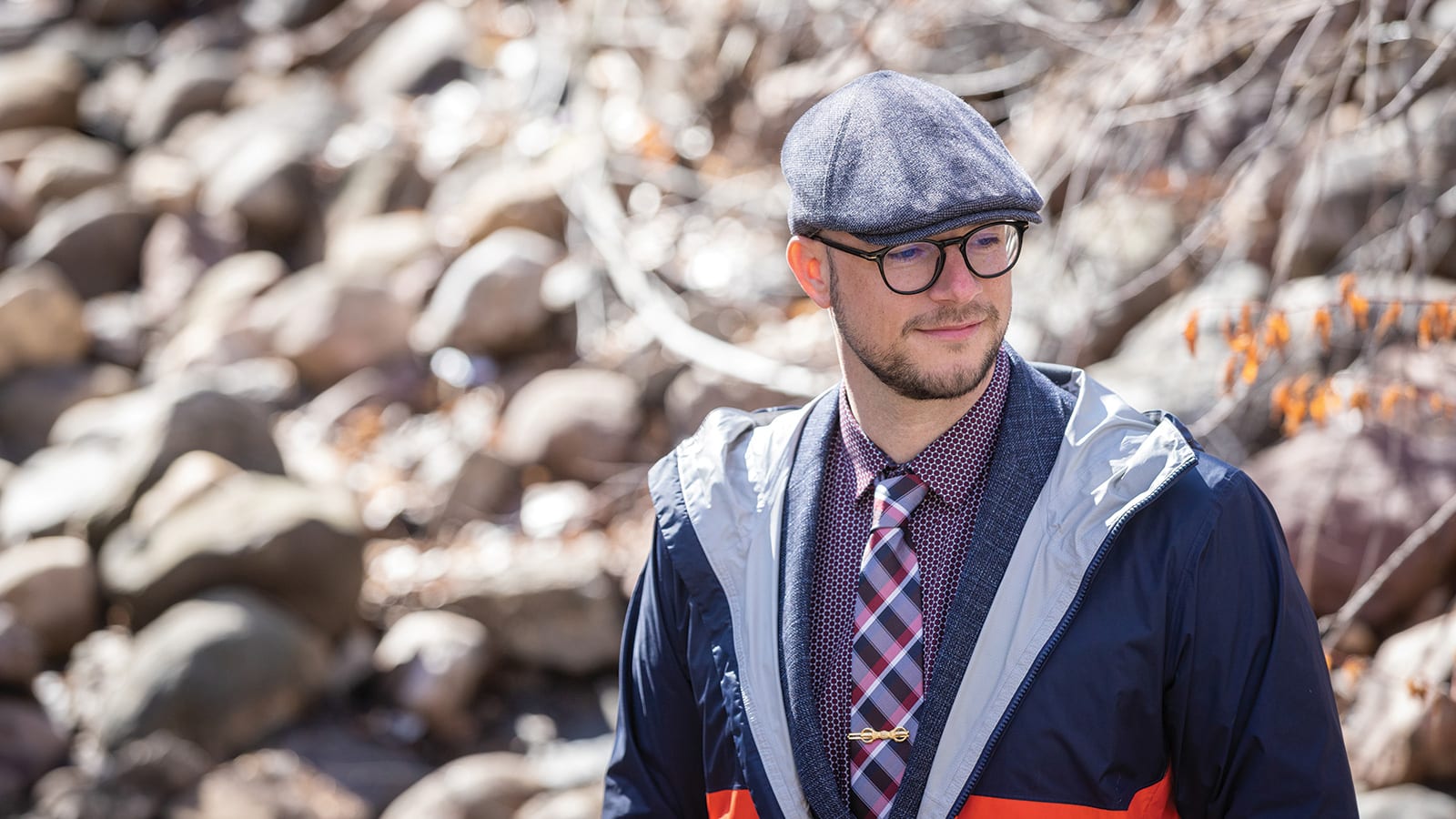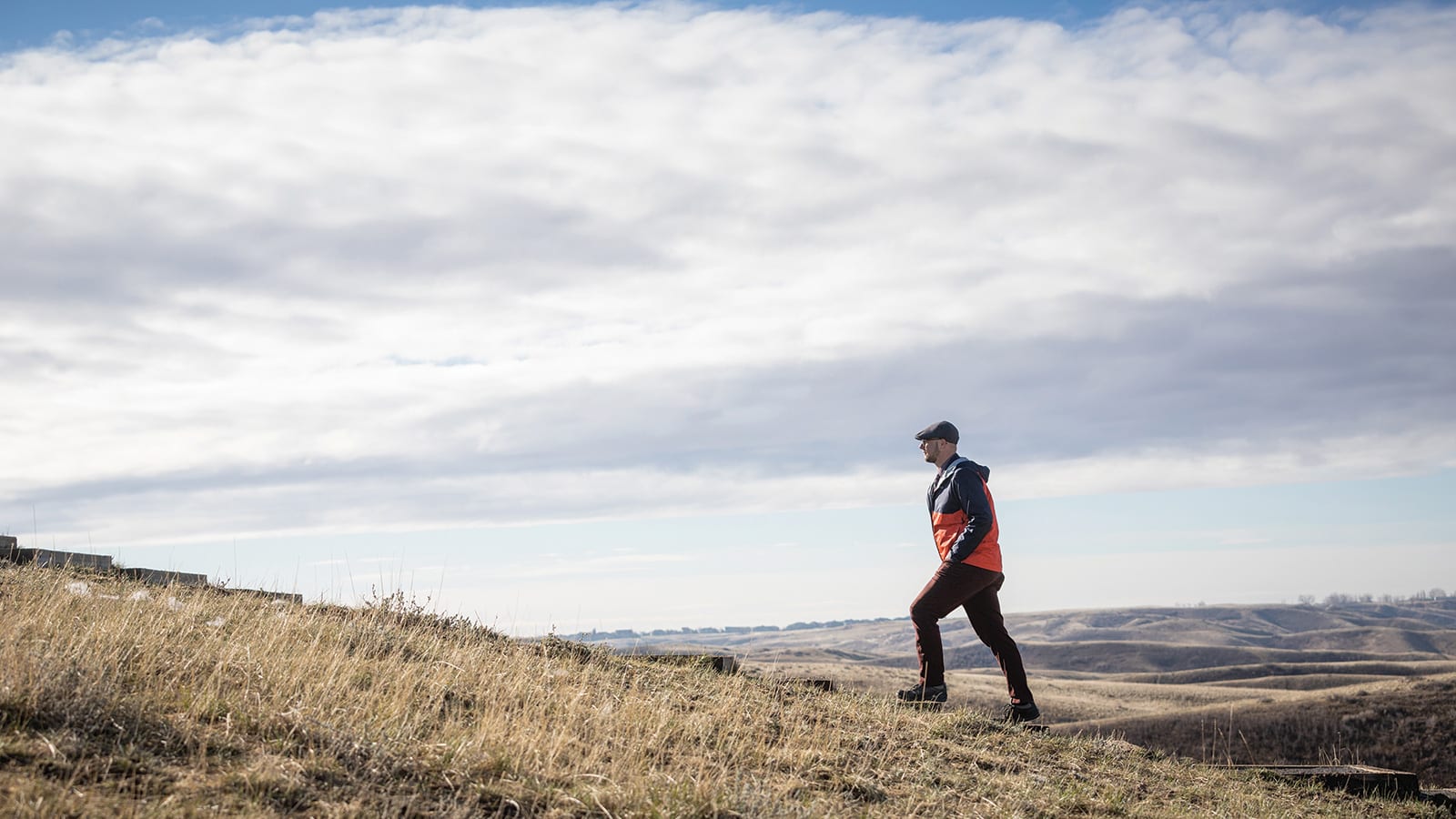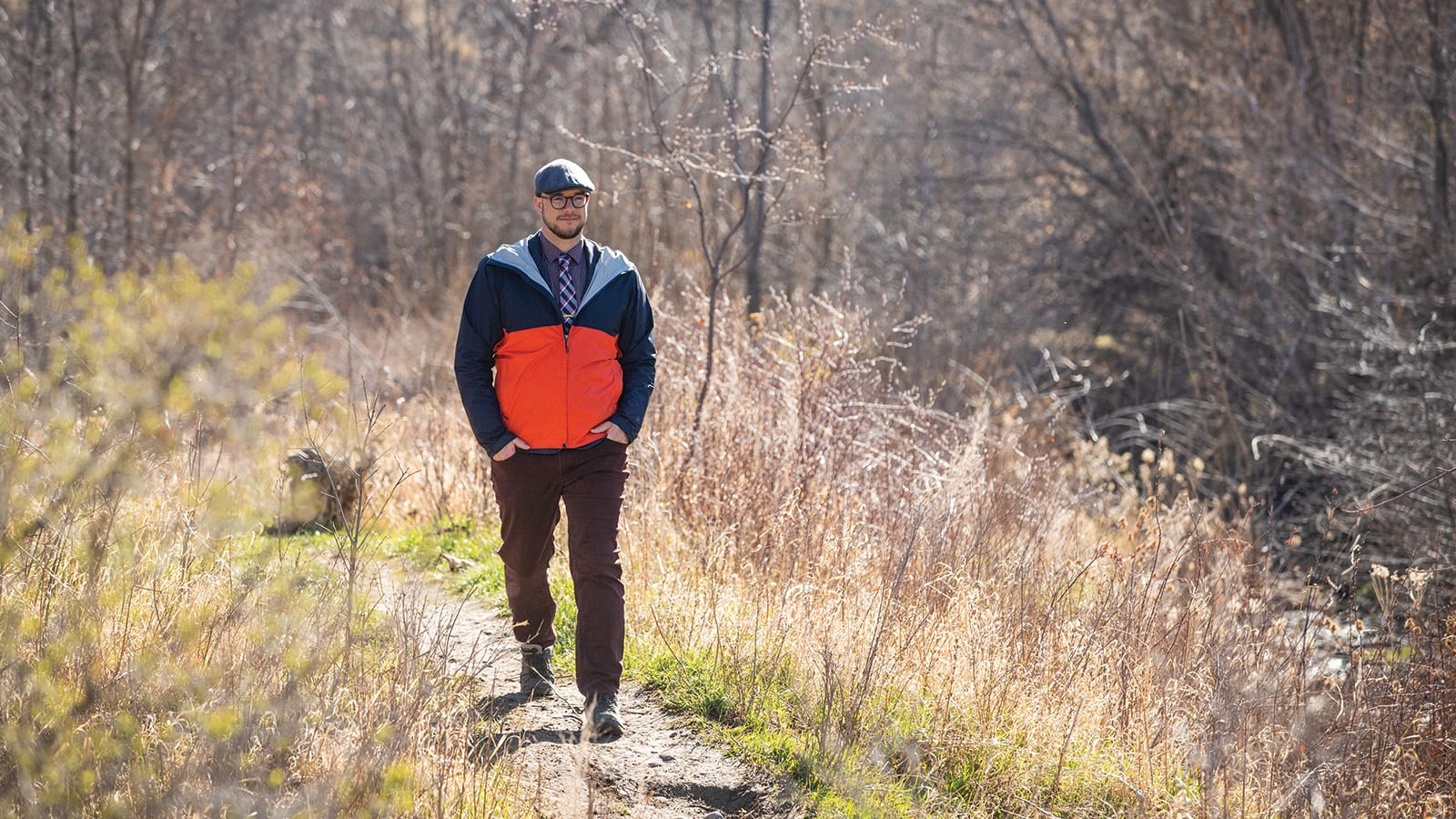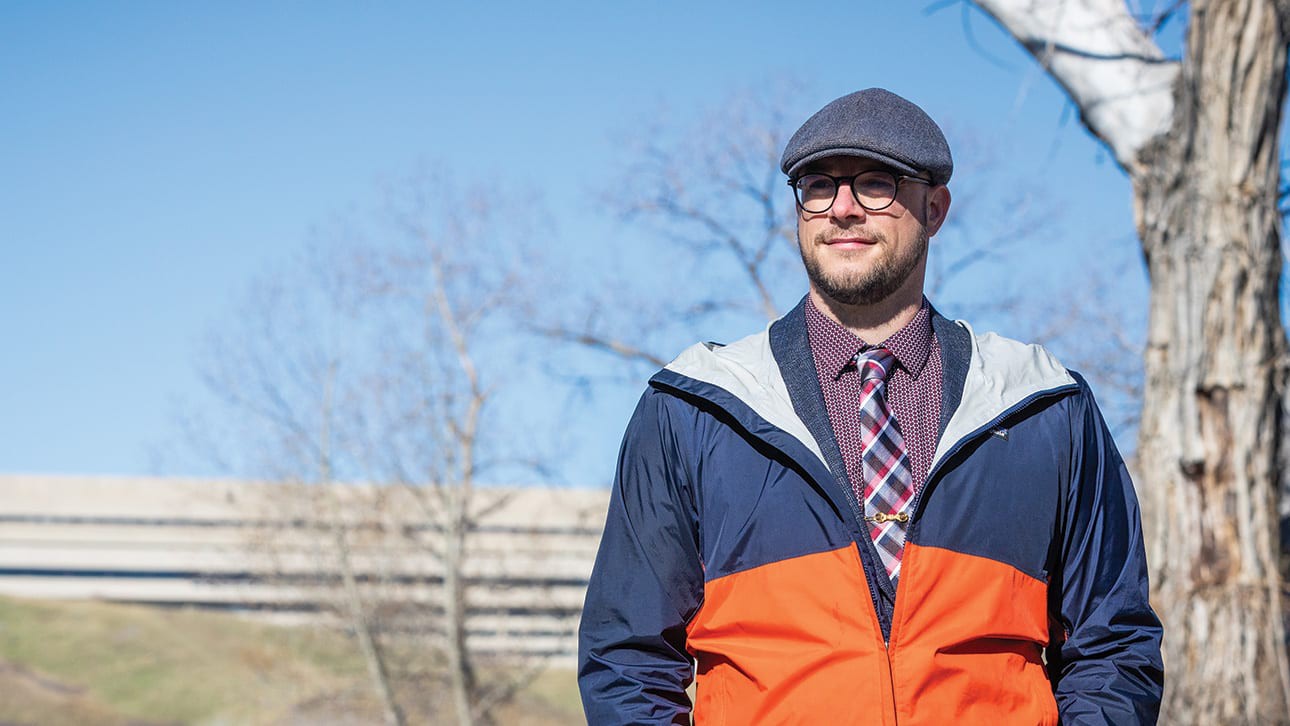Depending on how you tell it, the story of Shayne Dahl (General Studies 2004) is one of near misses and failures.
He was an uninspired student in high school. He was uncertain about whether to even apply to college, and he didn’t have the marks to go straight into a program. Eighteen years later, when applying for a job, he was ranked 50th out 56 applicants. A few years after that, despite getting great reviews of the work he was doing on a contract basis, he was turned down when he applied for a permanent position. He applied for more positions across the country, was named a finalist at four of them, but he didn’t get those jobs either. When the pandemic started, his housing situation fell apart, and he had to move from the East Coast with his wife and two children into his parents’ basement in Swift Current, Sask. – not exactly where you want to find yourself at the age of 37.
If you tell the story another way – the way Dahl sees it – he is exactly on the right path. It’s led him to extraordinary adventures, personal joy and professional successes with prestigious recognition and a career and home in Lethbridge where his life in academia began.
It all started in 2002, when Dahl completed some academic skill developing courses at Lethbridge College and then enrolled in the General Studies program. There, he encountered instructors like Marko Hilgersom (now the college’s Registrar), Douglas Wells, and Don Shade, whose teaching ignited a ferocious passion for learning about subjects ranging from anthropology to religious studies to Indigenous history and traditions.
After graduation, Dahl was ready to keep learning, and so he earned a bachelor’s degree from the University of Lethbridge, a master’s degree and the Governor General’s Academic Gold Medal from Trent University, and a PhD from the University of Toronto. That poor job ranking was from the first time he applied for a Social Sciences and Humanities Research Council (SSHRC) post-doctoral fellowship at McMaster University, but when he applied two years later after having some more teaching and research experience under his belt, his application was ranked first out of 74 applicants, the best in Canada. And although he didn’t get any of the permanent academic jobs he applied for during the pandemic, he persevered and applied for even more prestigious opportunities – and his tenacity paid off.
This spring, Dahl was named a post-doctoral fellow at the Reischauer Institute of Japanese Studies at Harvard University, a position he will hold remotely because of the pandemic. He also received a two-year Banting Postdoctoral Fellowship, one of Canada’s most prestigious post-graduate awards. He will be able to complete the work for both fellowships over the next three years back in the place where his academic journey all started – in Lethbridge, with his family, just a few kilometres away from the college.
“This success,” explains Dahl, “is so great and humbling for me. I’m grateful that my family is taken care of now. It’s also validating after so much rejection. Because when you get rejected so many times in a row, you start to think, ‘I guess it’s me.’
“But sometimes, once you aim higher, then suddenly you break through,” he adds. “It was so, so mind-bending to lose the job I was doing at a small university on a contract basis with great reviews, and then within a year, get the highest honours with the Banting and Harvard postdocs. That makes you dizzy! I didn’t know how to make sense of that at first.
“I guess it just means that you should never give up on yourself,” he concludes. “Maybe the reason you’re not succeeding is because you’re not aiming in the right direction or you’re not aiming high enough for yourself. But then, when you really aim high, sometimes that’s where, by fate or good fortune, that’s where you belong.”
“I guess it just means that you should never give up on yourself,” he concludes. “Maybe the reason you’re not succeeding is because you’re not aiming in the right direction or you’re not aiming high enough for yourself. But then, when you really aim high, sometimes that’s where, by fate or good fortune, that’s where you belong.”
{ SHAYNE DAHL }

High school wasn’t easy for Dahl. He was bullied and didn’t really fit into any clique, and he felt like an outsider wherever he went.
“I had no idea what I wanted to do after high school either,” he remembers. “My parents pushed me to go to college even though they never went. I didn’t even know what college was about. But my older cousin, Douglas LaChapelle (Criminal Justice 2000), came to Lethbridge College and is now a corporal for the RCMP in Maple Creek, Sask. I looked up to him, so I applied and was going to follow him here to do that.”
At the end of his Grade 12 year, though, Dahl went on a ride-along with a local police officer and, when the officer pulled over his favourite high school teacher for having a taillight out, he realized policing wasn’t the career he wanted. “I have all respect for that officer and police in general,” Dahl says, “but I saw it wasn’t for me. The experience reminded me of how much I appreciated that teacher and all I learned from him.”
Dahl switched programs to General Studies but needed to do a few academic skills courses first. From his first days on campus, he felt like he was on the right path. One of the close friends he made during his time at the college was Marcia Black Water (General Studies 2004), who now works as an instructor in the college’s General Arts and Science program.
“We had a class together, and on the first day Dahl turned around to me and said ‘hello’ before the class started and introduced himself,” recalls Black Water. “I was coming back as a mature student, and I am quiet when I’m getting the feel for a new setting. Shayne just started the conversation. He became my first new friend at the college.”
They took several classes together that year, including one that was then called Native Studies with instructor Don Shade.
“I learned about residential schools from Marcia from a presentation she did in that class,” says Dahl. “And I was like, ‘What?!’ I couldn’t believe it – I had the same shock that everybody had way later, or even just this summer. She said ‘Yeah, this is real.’ And I couldn’t understand it. I’m still trying to wrap my head around it. But I learned about that from Marcia.”
His class presentation was on a sweat lodge experience he had with members of the Blackfoot community, which ignited an interest that would drive much of his later research, including his undergraduate thesis titled “Sacrifice and Healing in Blackfoot Metaphysics,” his master’s thesis titled “Knowing Means Connecting with the Source of Life: Knowledge and Ethics among the Blackfoot,” and the research he plans to undertake as part of the Banting Fellowship, “Global Shugendō: Japanese Mountain Asceticism in Global Discourses of Indigeneity.”
Dahl’s passion is driven by a desire to learn more, as he’s quick to acknowledge how much learning remains for him and other settlers living on Indigenous territory. “We’re on the front line of societal ignorance,” he says. “But you can start learning any time. I started from zero – and ended up doing a master’s thesis on the ethics of dream knowledge in Blackfoot society. I think that’s a pattern in my path too. When I didn’t know something, I put the time and effort and energy into getting a very full understanding.”
The quest for understanding was nourished in a variety of classes at Lethbridge College, including an ethics class with Douglas Wells in his first semester. Dahl remembers one assignment where the students were given a moral dilemma, and then they had to choose which philosophical approach they would take to solve the problem. Dahl’s question was, in a family where the parents are members of different religious faiths, what religion should the child be raised in?
“And I looked through the philosophical paradigms that we had already explored, but I chose existentialism even though we hadn’t even covered that in class yet,” he recalls with a laugh. “I argued that every person, every individual should have the freedom to choose what their destiny and fate would be. He gave me 100 per cent on the assignment! I think that’s maybe the first time I ever did really well on an assignment in my life.”
The next class Dahl remembers having a significant influence on him was Religious Studies with Hilgersom – the area he would go on to major in for his undergraduate degree at university.
“I remember I was sort of cruising like, earning 60s and 70s when we were learning about Western religions,” he explains. “I was just plugging along. But when we hit Buddhism and Hinduism, it all changed. I think I aced the first exam. And even more importantly, I had never felt that curious before. And I’d never followed through on my curiosity with that intense level of focus.”
“I had never felt that curious before. And I’d never followed through on my curiosity with that intense level of focus.”
{ SHAYNE DAHL }
Hilgersom recalls the enthusiasm and engagement of Dahl, Black Water and others in their cohort in the early 2000s, as he and other instructors were working to develop and expand the college’s university transfer program.
“There was a real need for this program,” says Hilgersom. “A lot of students, like Shayne, didn’t have a good high school experience, and it’s not because they weren’t bright or didn’t get it. For some, high school was not a good culture – depending on who their teachers were, depending on who their social group was, they could get turned off of things so quickly.”
Helping to build a program that now builds a foundation in liberal education for hundreds of students each year and prepares to send them to transfer into the third and fourth year of university has been rewarding, Hilgersom adds.
“I really enjoyed it when students realized that school could be fun, that it could be interesting, that they were learning things they wanted to learn, and asking me questions, and then getting freaked out because there are more questions than answers,” says Hilgersom with a laugh. “But then that’s good, right? That’s kind of what you want.”
Dahl says he has integrated some of Hilgersom’s innovative teaching methods and that of other Lethbridge College instructors into his own teaching – especially teaching through story, dialoguing with students and creating memorable class experiences. And he expects to continue drawing on the lessons he learned nearly two decades ago at the college as he begins the first of his two prestigious postdoctoral fellowships this fall.
During the 2021-22 academic year, Dahl will be a member of the Edwin O. Reischauer Institute of Japanese Studies at Harvard University. With Lethbridge as his family’s home base, Dahl expects to travel to Boston for several extended visits to meet with colleagues, access libraries and research materials, and work to turn his dissertation, titled “Mountains of Time: Historical Consciousness and Sacred Mountains in Japan,” into a manuscript.
“To me, that is an even more important testament – people want to be around him and keep up with what he’s doing.”
{ MARKO HILGERSOM }
“This appointment will serve as a great launching pad for a book project I am working on that explores recent innovations in Japanese mountain asceticism – called Shugendō in Japanese,” said Dahl in an interview with the University of Lethbridge, where he worked as a sessional instructor earlier this year. “There are fascinating developments in this religion that have yet to be documented. I am uniquely positioned to do the research owing to my networks in Japan and am looking forward to rolling up my sleeves at Harvard.”
Between July 2022 and June 2024, Dahl will continue to be based in Lethbridge and connected to the University of Lethbridge as a Banting Fellow, which is considered the most prestigious postdoctoral award in Canada, as he works to “positively contribute to Canada’s economic, social and research-based growth.”
His research program during that period will focus on the transnational expansion of Japanese mountain asceticism and its place in global discourse about indigeneity. He will work with Drs. Hillary Rodrigues and John Harding, both of whom he describes as formative and inspiring professors during his years at the university. This is the first time an applicant for a Banting postdoc at the University of Lethbridge has succeeded in securing this prestigious award.
“The Banting Postdoctoral Fellowship will mark my long-awaited return to Lethbridge,” says Dahl. “From student to scholar, I feel I have come full circle.”
Black Water and Hilgersom both say they are glad to have Dahl back in Lethbridge and contributing to the community. “Shayne is such a smart guy, but with him, it’s not just the grades and all of that,” says Black Water. “It’s also the relationships he built and continues to maintain in the community. He really is just so interested in people and their stories.”
Hilgersom agrees. “Shayne has done a lot and worked hard,” he says. “He has intelligence and academic gifts. But even more, he’s a good person, someone people actually want to support. To me, that is an even more important testament – people want to be around him and keep up with what he’s doing. Community is still important to him.”
Dr. Kevin Smith, Dean of the Centre for Business, Arts and Sciences, says: “We are extremely proud of Shayne’s success and the fact that it all started at Lethbridge College. His experience shows that a career path doesn’t necessarily progress rapidly or indeed linearly, and that it is no impediment to start your academic journey with upgrading or academic skills courses.”
Blackwater, Hilgersom, Smith and Dahl all say that the college is an ideal place for students from all backgrounds – even those who weren’t especially successful in high school – to start on the path to a lifetime of learning. Students who have had near misses or failures, they say, and students who aren’t sure what path to take are all welcome here.
“You can have someone come in who doesn’t think they’re a scholar,” says Hilgersom. “But college is a process of self discovery and if you allow yourself the freedom to experiment, you’ll find out who you are. You can take the first step here – and like Shayne, you can go anywhere.”
“The Banting Postdoctoral Fellowship will mark my long-awaited return to Lethbridge,” says Dahl. “From student to scholar, I feel I have come full circle.”
{ SHAYNE DAHL }

LIBERAL ARTS AT LETHBRIDGE COLLEGE
Students who start their university degree at Lethbridge College can benefit from small class sizes, instructors who know their names, and a supportive and personalized environment. In addition, about 95 per cent of General Arts and Sciences courses transfer to colleges and universities across Canada and around the world. And with flexible course selections, flexible delivery methods and personal timetables, it’s easy to create an education that works at the time, place and pace that is best for students.
Marda Schindeler, Associate Dean of the Centre for Business, Arts and Sciences, notes that for many students, a general studies diploma – now called a General Arts and Sciences diploma – can serve as a stepping stone to further post-secondary education. “By offering a broad and diverse curriculum of courses,” she explains, “students get the opportunity to explore their interests while developing their foundational skills and core competencies, preparing them to be ready for whatever happens next.”
Some General Arts and Sciences courses offered in the year ahead include Blackfoot Language, Canadian History, Archaeology of Ancient Civilizations, Microbiology, Human Physiology, and more.
To learn more, go to lethbridgecollege.ca/gs; email [email protected]; or call 403-394-7338.

DID YOU KNOW?
Shayne Dahl isn’t the only Lethbridge College grad who started on the path to an advanced degree at Lethbridge College.
- Nadine Dalheim (Correctional Studies 2012) is the Fort McKay First Nations Manager of Addictions and Mental Health. She earned a PhD in child and adolescent development psychology.
- Kelly Damphousse (Law Enforcement 1982, Distinguished Alumni 1992) has been the Chancellor of Arkansas State University since 2017. He earned a PhD in sociology.
- Sandra Davidson (Nursing diploma 1994, Career Virtuoso 2019) has been the University of Calgary’s Dean of the Faculty of Nursing since August 2018. She earned a PhD in Leadership Studies.
- Stephen Graham (Computer Information Systems 1992) is an instructor in the college’s Computer Information Technology program. He earned a PhD in artificial intelligence.
- Karla Guyn (Environmental Sciences 1986, Distinguished Alumni 2006) is the CEO for Ducks Unlimited Canada. She earned a PhD in biology.
- Kristen Haase (Bachelor of Nursing 2005) is an assistant professor in Nursing at the University of Saskatchewan. She earned a PhD in nursing.
- Deborah Hadley (Multimedia Production 1998) is chair of Media and Information Technology at the college. She earned a PhD in higher education.
- Betty Lew (Community Services and Therapeutic Recreation 1997) is an acupuncturist and Traditional Chinese Medicine Doctor. She earned a Doctor of Traditional Chinese Medicine degree.
- Jan Semmelroggen (Agricultural Technology 2002) is the owner and managing director of Plato Enterprises Ltd. He earned a PhD in geography.
- Laura Vogelsang (NESA 2011) had served in a leadership role in the Nursing program at the college before taking on a tenure track teaching position at the University of Lethbridge this summer. She earned her PhD in nursing education.



